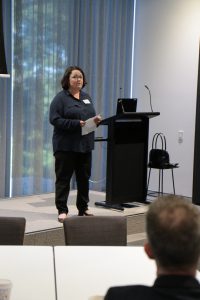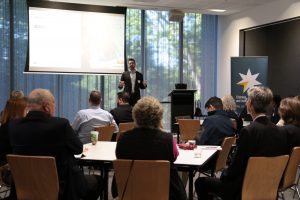Small business owners have detailed a range of issues affecting their operations — from workplace relations to State taxes and the skills shortage — at CCIWA’s Small Business Summit today.
Dozens of attendees expressed frustration with ongoing strike issues at Fremantle Port, which is affecting imports, as well as the inability to bring into WA skilled staff for jobs and unskilled people for training because of WA’s closed borders.
They also complained of ever-increasing land and payroll tax liabilities.
CCIWA President Nicolle Jenkins started the proceedings by reiterating just how difficult it was for business owners to make decisions on how they should be managing their operations when the threat of lockdowns continues to hang over their heads. She said the next 12 to 24 months would continue to be a challenging time even when borders opened because businesses could not return to how they were operating pre-COVID.

CCIWA President Nicolle Jenkins.
“The State Government is challenging us on our views, but we will remain constructive in articulating our key points about how business is being affected,” Jenkins said.
Workplace relations
On workplace relations, one importer expressed his immense frustration with the ongoing issues at Fremantle Port, saying the wharfies there were holding business to ransom. It would need both the Federal Government and the Fair Work Commission (FWC) to fix the problem.
“They’re not true strikes, they take a day off, come back to work for a day, then take another day off. It’s difficult enough to get containers, but then we have our own wharves holding us up,” he said.
Other members said they either wanted to keep, or were keeping, their staff numbers below 15 to avoid the stress of dealing with issues such as unfair dismissal laws. It was unreasonable to be lumped in with companies that had thousands of employees and teams of human resource consultants and in-house lawyers to manage their employee relations issues.
COVID measures
COVID restrictions and the State Government’s decision to compel 75 per cent of the WA workforce to get vaccinated was another hot-button issue.
One manufacturer explained that a number of his workers didn’t want to get vaccinated and it would be difficult, if not impossible, to continue operating if they refused to.
Learn more: Vaccinations and the workforce
“We can’t just let them go; we have to treat them amazingly just to keep them here in the first place. I can’t even raise the question with them,” he said.
Another member said the State Government talked about mandates, but did not understand how the mandates affected business.
“We can’t afford to lose workers, we can’t get enough workers, we can’t bring in people from overseas. Where do we stand? I’ve never been so stressed in my life after 22 years in this business,” she said.

CCIWA CEO Chris Rodwell addresses the Small Business Summit.
CCIWA Chief Economist Aaron Morey assured the gathering that the organisation would continue to press the State Government for clearer answers on when restrictions would be lifted.
“We’re as consistent as Glenn McGrath with his line and length in holding the position that we need answers on when we’re going to open up and leave lockdowns in the past,” Morey said.
State taxes
The State’s reliance on payroll and land taxes was another issue that exercised numerous members. They pointed out that many interstate and international companies were not obliged to pay either tax and this fact, combined with the other issues, was driving down both their ability to compete and their profitability.
Payroll tax has started capturing businesses that were never meant to be taxed in the first place, Jenkins noted.
“It’s a stealth tax — it creeps up on you and then your business changes fundamentally in terms of how you run it and how you plan for the future,” she said.
Skills shortage
Finally, the skills shortage is really hitting business hard. One member explained that his partner, who owned a childcare business, would have loved to attend the CCIWA summit but she was flat out at work as she couldn’t get anyone to cover her absence.
“TAFE isn’t keeping up with the number of people who need to be trained in this area — they’re a country mile behind where they need to be,” he said.
Other members agreed that too many young people were doing courses at university and TAFE that weren’t meeting the genuine needs of both individual companies and the State as a whole.
CCIWA will continue to hold similar summits to hear from our members and ensure we’re able to act as their voice by representing and advocating for their views to all governments.
To be part of WA’s peak business organisation, get in touch via 1300 422 492 or [email protected].
For general employee advice and guidance, contact CCIWA’s Employee Relations Advice Centre on (08) 9365 7660 or email [email protected].











